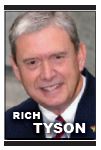Richard Tyson
Early in my career, I was fortunate to work for an extraordinary leader by the name of Bob Vanourek. Bob quickly became my indispensable mentor. I was one of several product managers who worked for him at Avery Label. Each of us had 100 percent responsibility to deliver profits for our respective products in the company’s office stationery line. This required each of us to work with a variety of staff functions within the corporation, including manufacturing, R&D, accounting and finance, HR, etc. In effect, each product manager had to compete with all the others for the attention and support of these various functions.{mprestriction ids="1,3"}
On my first day at Avery, Bob sat down with me and suggested that I had signed on for a challenging life of competing with the other product managers. He explained that often this could be quite frustrating since I would have no authority to force the various staff functions to focus on my needs and could never use that lack of authority as an excuse for not meeting my responsibilities. He summed up my challenge as having 100 percent responsibility and 0 percent authority.
My first reaction to this was less than optimistic. If the demands of my job were not negotiable, how could I be curtailed from demanding that others respond to my needs?
Bob clearly had anticipated this response. He smiled and said, “Rich, this may be the greatest leadership lesson you will ever learn. No matter what position you attain, no matter how much inherent authority that position carries, if you choose to fully own your responsibility while not choosing to force your will through your authority, you will be a leader that others want to work for.”
Why is this true? Because it requires leaders to become competent and trustworthy relationship-builders. It tends to shift the focus from an inherently self-centered authoritarian posture to a more compassionate appreciation for the situations, challenges and ideas of others. As leaders sincerely strive to build the trust of those with whom they work, a natural reciprocation occurs.
The late Stephen R. Covey referred to this relationship-building process as “making deposits to the emotional bank account.” In his best-seller, The 7 Habits of Highly Effective People, he defined an emotional bank account as one’s relationship with another. He explained, “By proactively doing things that build trust in a relationship, one makes ‘deposits.’ Conversely, by reactively doing things that decrease trust, one makes ‘withdrawals.’ The current ‘balance’ in the emotional bank account will determine how well two people can communicate and problem-solve together.”
In my job at Avery, I found that by purposely making deposits to the emotional bank accounts of others, they gradually became strong supporters of the things for which I was responsible. I have continued to find this to be true throughout my career. Even so, occasionally I have had clients who have expressed doubts about the efficacy of this approach. They have suggested three fundamental flaws:
1. There are times when authority must be employed to get the job done. I readily agree with this. When the house is on fire, you don’t request evacuation, you demand it. But most of the time, the house is not burning. I strive to employ my authority no more than 10 percent of the time — less if possible.
2. This seems manipulative; isn’t it better to be honest regarding the demands for performance? This is a fair observation — if your intentions are manipulative. However, if you sincerely care about those with whom you work, you will extend compassion and appreciation to them unconditionally. Their reciprocation will then come naturally.
3. I know what needs to be done; engaging with others without clearly demanding action is terribly inefficient. My experience, both personally and with most of my clients, has been the opposite of this. By relying on our mutually respectful relationships, more collaboration has occurred, problem-solving has been enhanced and both effectiveness and efficiency have been achieved.
Over my career of over nearly five decades, I have learned that leadership has required me to “own” the job, to recognize that I must not shrink from responsibility to lead and pursue the outcomes required of me.
This isn’t too tough when things are going well, but like virtually every leader, I have had times that have tested my mettle. It is during those episodes that it becomes very tempting to blame others for problems or to shrink from my responsibility. It has been equally tempting to exercise my authority in a demanding and tyrannical fashion. On the other hand, when I have followed Bob’s wisdom, I have always found success.
I have learned that the best leaders shoulder their responsibility wisely, showing up consistently and owning inevitable challenges, problems and opportunities. They recognize that the exercise of authority is a weapon to be used very infrequently and never with anger. While recognizing that the buck will indeed stop with them, they liberally share problems, opportunities and challenges with others.
Richard Tyson is the founder, principal owner and president of CEObuilder, which provides forums for consulting and coaching to executives in small businesses.{/mprestriction}








